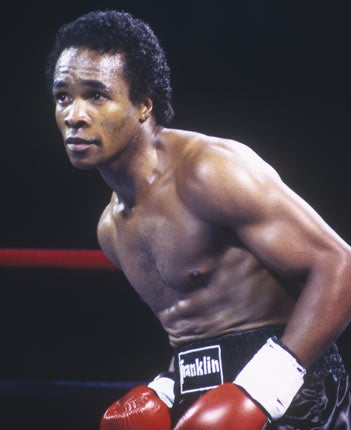Boxing: Sugar Ray Leonard claims sexual abuse by 'Olympic coach'

Your support helps us to tell the story
From reproductive rights to climate change to Big Tech, The Independent is on the ground when the story is developing. Whether it's investigating the financials of Elon Musk's pro-Trump PAC or producing our latest documentary, 'The A Word', which shines a light on the American women fighting for reproductive rights, we know how important it is to parse out the facts from the messaging.
At such a critical moment in US history, we need reporters on the ground. Your donation allows us to keep sending journalists to speak to both sides of the story.
The Independent is trusted by Americans across the entire political spectrum. And unlike many other quality news outlets, we choose not to lock Americans out of our reporting and analysis with paywalls. We believe quality journalism should be available to everyone, paid for by those who can afford it.
Your support makes all the difference.The former boxing champion Sugar Ray Leonard, regarded as one the sport's greatest exponents, has revealed that he was sexually abused as a teenager by a prominent Olympic coach.
Leonard, a stylish fighter who won titles in five different weight divisions, makes the claim against the unnamed coach in his autobiography, to be published next month.
A gold medal winner at the 1976 Montreal Olympics, Leonard, 55, said he had been haunted by the ordeal throughout his career and had decided to reveal in his book what had happened, to help his healing process.
The revelations follow a number of claims of sexual abuse by sports coaches against youngsters in their care.
Leonard describes two incidents involving the "prominent Olympic boxing coach". The first was when he was competing at a tournament in Utica, New York, at age 15. The coach watched as Leonard and another teenage fighter took a bath in a tub of hot water and Epsom salts.
They suspected "something a bit inappropriate" was occurring, Leonard writes, but did not want to question a strong male authority figure.
The second, some years later, occurred in a car in a deserted parking lot, when the coach was discussing with him his prospects at the 1976 Olympics.
"Before I knew it, he had unzipped my pants and put his hand, then mouth, on an area that has haunted me for life. I didn't scream. I didn't look at him. I just opened the door and ran," Leonard writes in The Big Fight: My Life In and Out of the Ring.
Leonard, regarded by many experts as second only to Muhammad Ali in the boxing pantheon, said: "I realised I would never be free unless I revealed the whole truth, no matter how much it hurt."
However, Dave Jacobs, who has known Leonard since he was a child and who was his first trainer, said he was unaware of any abuse.
"He never talked about that to me and no one in the group ever mentioned it, so I assume he never talked about it to them either," Mr Jacobs said. Angelo Dundee, who also trained Leonard, said he never discussed "personal stuff" with the fighter. According to the New York Times, Leonard, now enjoying a second career as a reality television star, also details in the book his cocaine use, growing up in a home with alcohol abuse, surviving a car crash with his mother, and fathering a son aged 17.
Last month the former high jump world record holder Patrik Sjoberg shocked the Swedish athletics world by revealing that his coach and stepfather, Viljo Nousiainen, sexually abused him as a young boy.
Sjoberg, who won two Olympic silver medals and set a world record of 2.42 metres in 1987, said in his autobiography What You Didn't See that the abuse started when he was 10 and continued into his teenage years. Nousiainen died in 1999. Last year an investigation found that 36 swimming coaches had been barred by USA Swimming after allegations of sexual misconduct.
Leonard, who won his first world title in 1979, was the first boxer to earn $100m in fight purses. He fought at divisions ranging from welterweight to light heavyweight, and his epic 1980 bout with Roberto Duran, which Leonard controversially lost on points, became known as the Brawl in Montreal.
Join our commenting forum
Join thought-provoking conversations, follow other Independent readers and see their replies
Comments